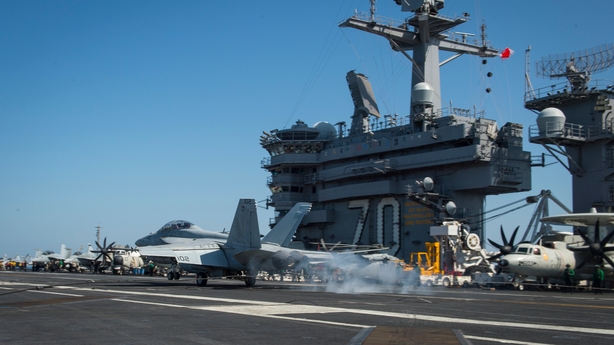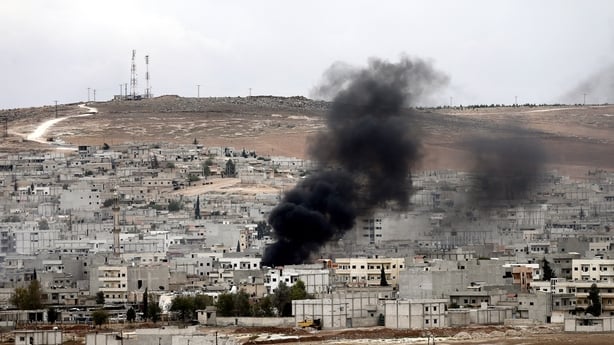The EU has agreed to expand sanctions against Syria, adding 16 names and two entities to the blacklist for their role in a "brutal war" against their own people as IS fighters advance across Kobane.
As part of the sanctions, 14 people will have their assets frozen and will be banned from travelling for taking part in "the violent repression of the civilian population," the EU said.
Another two people and two entities will be punished for "providing practical support" to Syrian President Bashar al-Assad, it said.
The names of those affected will be published tomorrow in the EU's Official Journal when the measures will take effect.
According to diplomatic sources, the new sanctions will mainly affect officials recently appointed by President Assad.
Today's announcement brings the total number of Syrians under EU sanctions to 211 and the number of entities to 63.
The EU foreign ministers additionally recommended that jet fuel exported to Syria is banned as it is being used by President Assad's airforce to launch "indiscriminate air attacks against civilians".
This political agreement will come into effect after approval by EU leaders.
An oil embargo and curbs on financial transactions in Syria have also been implemented by the EU.
Meanwhile, Turkey has said it was assisting Iraqi Kurdish peshmerga fighters to cross its borders to join Syrian Kurdish forces battling Islamic State fighters for the Syrian town of Kobane.
"We are assisting peshmerga forces to cross into Kobane," said Turkish Foreign Minister Mevlut Cavusoglu.
He said talks on the issue were ongoing but he did not give further details.
"We have no wish at all to see Kobane fall" to IS fighters, Mr Cavusoglu said.
Kurdish people watch the Syrian town of #Kobane from the Turkish border. Photos by @Kilicbil #AFP pic.twitter.com/j2rjrfDAuP
— AFP Photo Department (@AFPphoto) October 20, 2014
The announcement represented a major switch by Turkey, which until now has refused to allow Kurdish fighters to cross its border to join the fight for Kobane just a few kilometres to the south.
Turkey has come under increasing pressure over the last month to step up its support for the international coalition fighting IS.
But Turkey has so far refused to use its own troops or even let US forces launch their bombing raids on IS from the Incirlik air base in the nearby Adana province.
It said Turkish airspace was not used during airdrops carried out last night by the United States to support Kurdish fighters defending Kobane.
The US military dropped weapons, ammunition and medical supplies to Syrian Kurds in the battleground city for the first time, US Central Command said last night.
A C-130 cargo aircraft conducted "multiple" airdrops of the supplies provided by Kurdish authorities in Iraq.
The supplies were "intended to enable continued resistance against ISIL's attempts to overtake Kobane," CENTCOM said in a statement referring to IS fighters.
Secretary of State John Kerry said the US told Turkey that the arms drop did not represent a change of US policy, but was a "momentary" response to the crisis.

The United Nations estimates that more than 191,000 people have died in Syria since a 2011 popular uprising against President Assad turned into intense sectarian conflict which has also displaced millions and destroyed much of the country.
US airstrikes continue in Kobane
Over the weekend US-led warplanes launched 11 air strikes near Kobane, CENTCOM said, helping Kurdish fighters repulse a new IS attempt to cut their supply lines from Turkey.
So far, US forces have conducted more than 135 airstrikes against IS in Kobane alone.
"Combined with continued resistance to ISIL on the ground, indications are that these strikes have slowed ISIL advances into the city, killed hundreds of their fighters and destroyed or damaged scores of pieces of ISIL combat equipment and fighting positions," CENTCOM said.
"However, the security situation in Kobane remains fragile as ISIL continues to threaten the city and Kurdish forces continue to resist."

CENTCOM Commander General Lloyd Austin has warned that the city could fall.
Kobane's Kurdish defenders have been under IS assault for more than a month.
From Saturday into yesterday morning, 31 IS militants died in the battle, said the Syrian Observatory for Human Rights.
Coalition air strikes near Kobane hit 20 IS fighting positions, five IS vehicles and two IS-held buildings, according to CENTCOM.
The observatory, which has a network of sources inside Syria, said 15 fighters were killed in the air strikes, while 16 others died in ground clashes along with seven Kurdish fighters.

